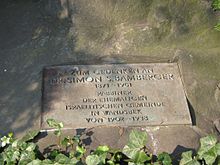Simon Bamberger (rabbi)
Simon Simcha Bamberger (born July 21, 1871 in Würzburg , † April 13, 1961 in Kirjat Motzkin , Israel ) was a German, later Israeli rabbi .
Early work
Simon Bamberger came from a long-established family in Würzburg. He obtained his rabbi diploma in 1894 and then worked as an assistant at the rabbinate in his hometown. In 1899 he moved to Hohensalza , where he worked as a rabbi and religion teacher. Here he met Bertha Cohn, whom he married and with whom he had three daughters by 1910. On June 1, 1902, he took over the post of community rabbi from David Hanover in Wandsbek , where the family lived at Schloßstraße 2d.
During his time in Wandsbek, Bamberger was alternately integrated and excluded. In 1903 he spoke at the celebration of the 100th anniversary of the Hussar Regiment No. 15 , which was stationed in Wandsbek. In 1913, together with community leader Benny Beith, he filed a protest with Mayor Erich Wasa Rodig against teachers at the Matthias Claudius grammar school who were considered anti-Semites. During the First World War , Bamberger had to take over the census of Jews . In an official report in 1919, the mayor described the rabbi as a person who strictly adhered to morals and about whom nobody had complained. The most important event of his professional life was probably the celebration of the 25th anniversary in 1927, at which Jews and Christians, administrative staff and politicians congratulated Bamberger and gave eulogies.
time of the nationalsocialism
By 1930 at the latest, when his house was defaced with racist slogans, Bamberger was exposed to open anti-Semitism. His daughter Kela left the German Reich for Palestine in the same year , his daughters Male and Hella moved there in 1935. In 1936 Bamberger visited his three children who had emigrated and then returned to Wandsbek. On an evening attended by the Jewish community, he spoke positively of the experiences of his trip.
After a registered nightly prayer in Wandsbek, the National Socialists imprisoned Bamberger and interrogated him for several hours in an unworthy manner. The detention ended the next morning. Another protective custody by the Gestapo took place because Bamberger presided over the Henry Jones Lodge. In addition to being insulted on the street, the rabbi had to experience high school students defacing the walls and doors of his apartment. The Gestapo confiscated books in Hebrew addressed to Bamberg and gave them to a foreign pastor for examination. The rabbi did not get the books until months later and was hampered in his research.
Bamberger then left Wandsbek and moved with his wife to Schlueterstrasse 37 in Hamburg in 1937. Here he was head of the Museum of Jewish Folklore and the library of the community, which were located at 6 Beneckestrasse. He also had a private library there. From 1938 he was no longer able to access his books, or to take them out of the country. The synagogue had to close in October 1938. Bamberger went back to Wandsbek and encouraged the few Jewish families living there to continue to live the Jewish culture despite the circumstances.
emigration
After humiliating checks on their luggage , Bamberger emigrated with his wife to Kirjat Motzkin in the then Mandate Palestine in February 1939 . The couple later bought an apartment in a community house here. The rabbi's library in Hamburg was destroyed when the building was destroyed by bombs in 1943.
When the board of directors of the Hamburg Jewish Community was planning to move graves at the Jenfelder Strasse cemetery in 1953, they asked Bamberger for an assessment of this measure. As a former parish council, he recommended refraining from reburial as the religious law provided for eternal rest for the dead. The community carried out the reburial anyway, but to a lesser extent than originally planned.
Simon Bamberger died in Israel in 1961. A memorial stone for him has been in the Wandsbek Jewish cemetery since 1984 .
Publications
During his time in northern Germany, Bamberger took on several honorary positions. This included the chairmanship of the Rabbis Association of Northern Germany and the management of the Association of Jewish Congregations in Schleswig-Holstein. In these positions, but also as chairman of the Henry Jones Lodge and museum director, he wrote essays, articles and reviews. His contributions appeared, for example, in the "Israelite Calendar" and in the "Yearbook for the Jewish Communities in Schleswig-Holstein".
literature
- Astrid Louven: Bamberger, Simon . In: Franklin Kopitzsch, Dirk Brietzke (Hrsg.): Hamburgische Biographie . tape 4 . Wallstein, Göttingen 2008, ISBN 978-3-8353-0229-7 , pp. 33-34 .
| personal data | |
|---|---|
| SURNAME | Bamberger, Simon |
| ALTERNATIVE NAMES | Bamberger, Simon Simcha |
| BRIEF DESCRIPTION | German, later Israeli rabbi |
| DATE OF BIRTH | July 21, 1871 |
| PLACE OF BIRTH | Wurzburg |
| DATE OF DEATH | April 13, 1961 |
| Place of death | Kirjat Motzkin |
